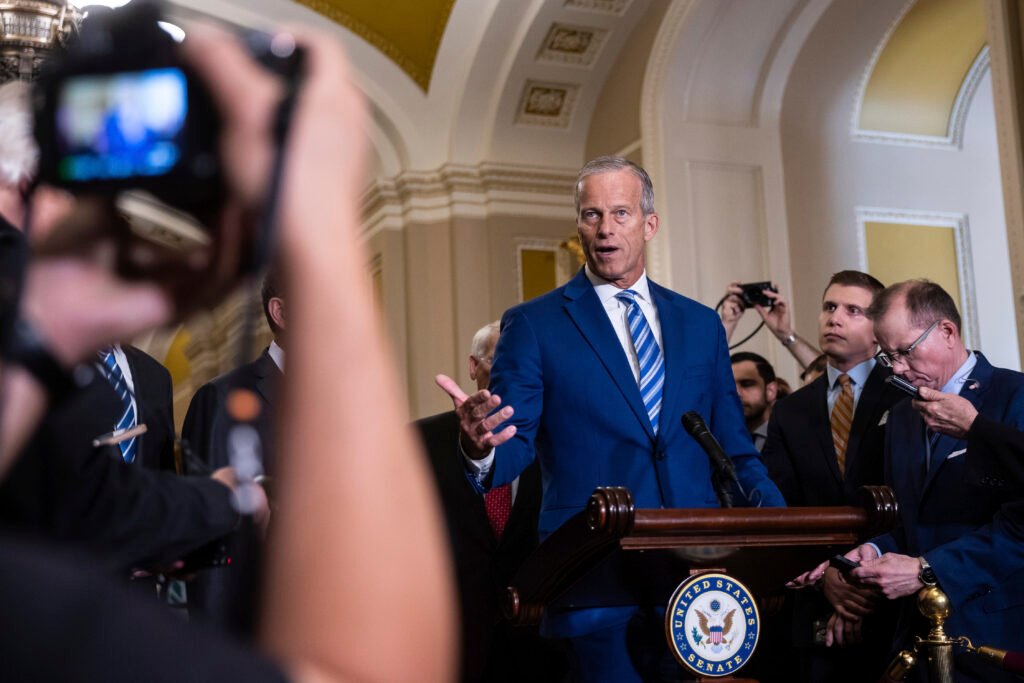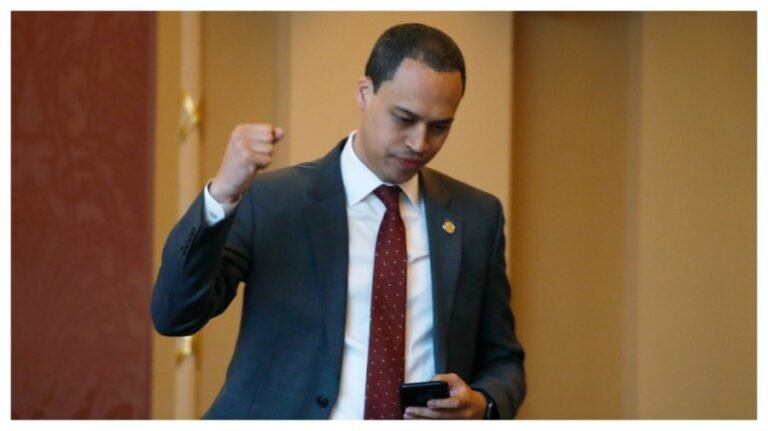
In Senate Majority Leader John Thune’s perfect world, he’d be ready by this time next week to start voting on the GOP’s sweeping megabill.
But this world is far from perfect, Thune and fellow Senate Republicans learned Tuesday. A host of concerns from diverse pockets of the GOP are threatening his grand plan of winning Senate passage by July 4 — with some in his ranks warning of an epic face-plant if Republican leaders push too hard, too fast.
“My guess is it will fail,” predicted Sen. Ron Johnson (R-Wis.) when asked about potentially calling votes next week. “I don’t want to see it fail. I want this thing to succeed.”
Monday’s highly anticipated release of legislative text on tax, health care and other key policy provisions only served to underscore the challenges yet to be overcome. Fiscal hawks like Johnson are sounding the alarm that the bill doesn’t do nearly enough to lower the deficit. More moderate senators are voicing deep unease about new Medicaid provisions. Still others don’t like the proposed changes to clean-energy incentives or President Donald Trump’s proposed tax cuts.
These considerable policy gaps are up against a thin Republican majority — Thune has only three votes to spare, and one all-but-guaranteed “no” vote in Sen. Rand Paul of Kentucky — and a seemingly impossible timeline. Leaders are hoping to take a first vote on the megabill by next Wednesday or Thursday, according to GOP senators and aides, setting up final passage over the weekend.
But committees are still trying to get fiscal estimates for their proposals as well as final rulings from the Senate parliamentarian, which could jettison some of their pet provisions from the bill at the 11th hour.
While Vice President JD Vance backed the July 4 target for Senate passage during a closed-door lunch with Republican senators Tuesday, he pointed to the August recess as the ultimate deadline for getting a bill to Trump’s desk, according to two attendees.
The pessimism about quick Senate action has drifted downtown, where lobbyists are still poring over the 549-page text released Monday by the Senate Finance Committee. K Street power players are closely monitoring the negative reactions inside the Senate GOP.
“The general sense downtown that is causing concern is that the bill in its current form cannot pass either body,” said one lobbyist at a prominent Washington firm who was granted anonymity to share their views candidly. “So the bill is still, by necessity, open and will be changed.”
Another lobbyist, speaking under similar conditions, said that as Senate Republicans “have to shift policy to get votes, there are big dollars in play” that could force lawmakers to explore deep cuts in other policy areas — cuts that could expose entirely new fissures.
And that’s setting aside another inconvenient fact for Republicans: Whatever changes the Senate makes, the House will have to weigh in again after only narrowly passing its carefully crafted version of the bill last month. Some senators are already suggesting the House will just have to deal with whatever ends up getting sent back over.
“We first get 51 senators together and then we’ll see what the House can do,” Sen. John Cornyn (R-Texas) said Tuesday, referring to the contentious Finance text as “an initial draft.”
Getting 51 senators, however, is looking like a tall order.
GOP Sens. Josh Hawley of Missouri and Susan Collins of Maine reiterated their concerns Tuesday with the Finance proposal to cap medical provider taxes that fund state obligations to Medicaid, arguing that it could hurt rural hospitals.
Though her state doesn’t use provider taxes, Sen. Lisa Murkowski (R-Alaska) has her own concerns about different Medicaid language pertaining to new work requirements. Asked if she is prepared to vote down the bill over the Medicaid issues, she said, “I don’t think it’s going to stay in this form.”
Hawley separately critiqued the tax provisions rolled out by Senate Finance Chair Mike Crapo (R-Idaho), calling the package a “departure from what President Trump called for” in a Tuesday morning interview with MAGA strategist Steve Bannon: “They want to roll back some of these Trump tax cuts, the populist tax cuts: no taxes on tips, no taxes on overtime.”
He told reporters in the Capitol that he had spoken with Trump about the Senate proposal, describing the president as “surprised” by the bill’s Medicaid language. And Collins, who met with Vance separately this week, said she is still suggesting changes to the bill.
Thune, after the Senate’s closed-door lunch, acknowledged he is still negotiating with members of his conference, including Hawley and Collins, about “components or pieces of the bill that they would like to see modified or changed.”
Items that are likely to be the subject of the heaviest lobbying include a tax cut for pass-through businesses that was reduced from the House plan as well as a planned increase in university endowment taxes — even though Senate Republicans significantly softened what House Republicans had proposed.
The job of threading the needle has largely fallen to Crapo, the stealthy dealmaker who crafted the Medicaid and tax portion of the legislation and briefed GOP conference members Monday on the policies.
“He did what he does best: balanced everybody’s concerns and found the sweetest spot he could find, and it’s not adequate for some people,” said Sen. Kevin Cramer (R-N.D.) of how Crapo’s been fielding concerns from his colleagues.
One major issue is that Crapo’s draft made some business tax cuts permanent rather than sunsetting them at the end of 2029, as the House did — a key priority for himself and his fellow Finance Committee Republicans, but at the expense of some other provisions, including the provider tax.
“Every spending reduction that we were able to achieve was helpful in achieving the permanence,” Crapo told reporters Tuesday, estimating the Medicaid changes alone generated hundreds of billions of dollars in offsets.
But GOP senators who expected Crapo’s Medicaid language to largely match the House’s were caught off guard by those changes, and now he and Thune are dealing with potentially time-consuming pushback.
“I never thought we could get it done by the Fourth of July,” said Murkowski. “But you know what? I’m not in charge of the schedule.”


